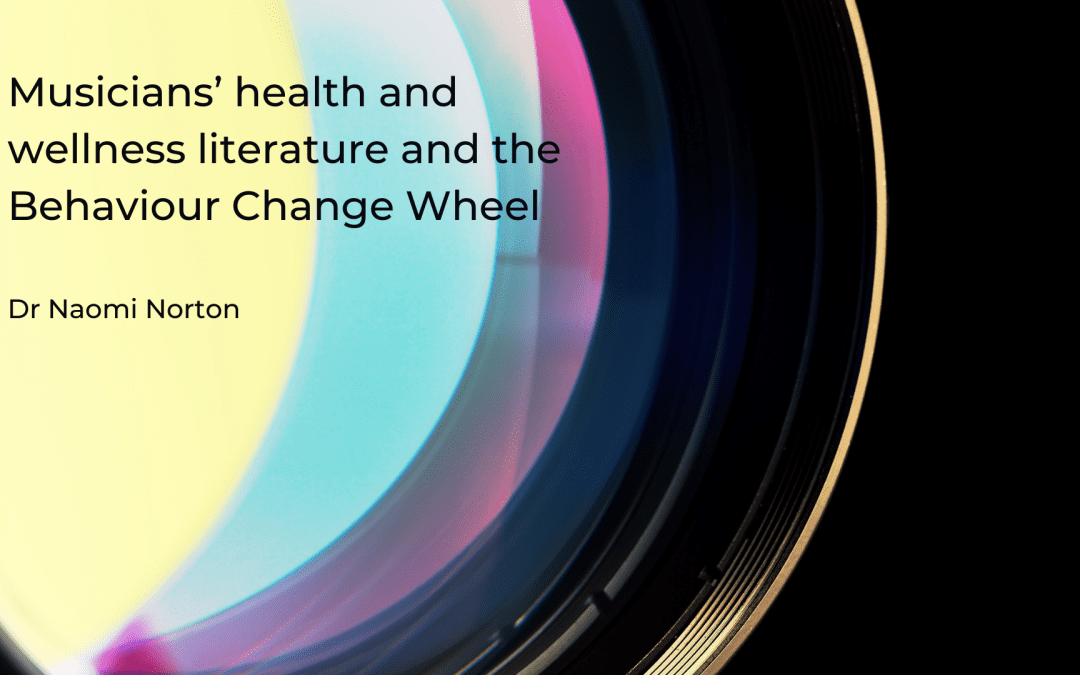Researcher, lecturer and musician, Dr Naomi Norton’s paper ‘Considering musicians’ health and wellness literature through the lens of the Behaviour Change Wheel’ was published in the Journal of Music, Health, and Wellbeing in Autumn 2020. Naomi completed a PhD focusing on health promotion in instrumental and vocal music lessons, and previously led a BAPAM peer support initiative in tertiary music education which encouraged students to seek support for health problems at an early stage. Following a comprehensive literature review, and consultation through the Healthy Conservatoires network, Naomi worked with BAPAM on the development of content for our healthy practice training programme.
One of BAPAM’s main goals over the past year through our online peer support and training has been to support community, motivation and engagement with creative practice, reacting to the effects of lockdown, change and lost work. Supportive creative communities and environments are essential parts of healthy arts practice. While individual behaviour is part of the picture, systemic changes also have to be considered. The creative sector and industry organisations are responsible for improvement as well. Dr Norton’s paper explores how the Behaviour Change Wheel elucidates the interactions between a musician’s ‘internal locus of control’ and environmental factors that we can improve through individual and collective action.
“My article ‘Considering musicians’ health and wellness literature through the lens of the Behaviour Change Wheel’ was written about 12 months ago (in a pre-COVID19 world) but the literature and conclusions are still relevant today. It serves as a journey marker in my engagement with concepts drawn from Health Psychology and reconciliation of those concepts with my ‘home’ discipline of Musicians’ Health and Wellness (MHW). This is the first article to consider the Performing Arts Medicine bibliography through the lens of the BCW and thus, I hope, a starting point for discussion and development. The article includes an extensive reference list and introduction to the BCW that is intended as a resource for researchers and practitioners. Beyond that, the article highlights a need for those involved in protecting and enhancing MHW to move beyond a reliance on education and training intended to enhance the capability of individuals and focus more on creating social and physical opportunities that enable musicians to thrive. The influence of environment on musicians’ health-promoting behaviours cannot be underestimated and goes a long way to explain why something that seems straight-forward and common sense in a training session is so hard to enact reliably in the ‘real world’. This article provides suggestions for how we can use insights from Behaviour Change Science to design robust interventions that are effective at improving the health and wellness of all musicians.
Acknowledgements and links to relevant information and influences: My interest in Health Psychology began in 2016 when Raluca Matei invited me to share insights from my doctoral research at events designed to build connections between MHW, Performing Arts Medicine, and Health Psychology. Building on my reading about the Behaviour Change Wheel and fruitful conversations with colleagues – notably Raluca, Ann Shoebridge, Claire Cordeaux, and delegates at a European Health Psychology Society Conference (Aberdeen, 2016) – I was fortunate to be able to attend the University College London (UCL) Centre for Behaviour Change (CBC) Summer Course in August 2019 with support from the University of York Department of Music (where I am an Associate Lecturer in Music Education). This course deepened my understanding of the BCW and helped me decide how to use it to best effect to inform my development of a new undergraduate module. Preparation of the article took place alongside my attendance at the CBC course and development of the module and these three activities informed each other and propelled my thinking in new directions.”
Dr Naomi Norton, January 2021

